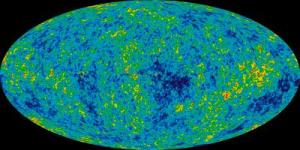Nov 8 2013
In a new study, Dartmouth researchers rule out a controversial theory that the accelerating expansion of the universe is an illusion.
 The detailed, all-sky picture of the Cosmic Microwave Background in the infant universe reveals 13.77 billion year old temperature fluctuations (shown as color differences) that correspond to the seeds that grew to become the galaxies. Credit: NASA/WMAP Science Team
The detailed, all-sky picture of the Cosmic Microwave Background in the infant universe reveals 13.77 billion year old temperature fluctuations (shown as color differences) that correspond to the seeds that grew to become the galaxies. Credit: NASA/WMAP Science Team
While the findings don't explain the cosmic speed-up, they eliminate one provocative possibility that our planet, solar system and galaxy are at the center of the universe and that there is no dark energy. The findings appear in the journal Physical Review D. A PDF of the study is available on request.
The 2011 Nobel Prize was awarded for the discovery that the expansion of the universe is accelerating. One leading idea to explain the acceleration is a new, mysterious substance called dark energy, which is thought to make up nearly three-fourths of the energy of the universe. But another alternative is that the Earth, our solar system and Milky Way galaxy are at the center of the universe. That theory violates the standard assumption that the universe has no center, but if true, then cosmic acceleration could be explained without dark energy or any new laws of physics.
But Dartmouth researchers found that this model can't hold up to other observational tests. The sky glows with light left over from the Big Bang, also known as the Cosmic Microwave Background, so they calculated how that glow would be affected. Their findings show that the model's prediction is completely contrary to the glow that has been measured.
"Essentially, we held a mirror up to the universe and asked if the reflection was special," says Robert Caldwell, a professor of physics and astronomy who co-wrote the article with undergraduate physics major Nina Maksimova. "The reflection shows that we do not appear to live in a special location, and decisively excludes this explanation for the universe's accelerating expansion. It would be a great relief to be able to understand a basic problem of cosmology within the known laws of physics, but our research is an important step in explaining the physics responsible for the cosmic acceleration."